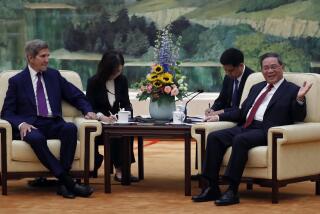China-Japan Relations Deadlocked as Tokyo’s Envoy Returns Home
- Share via
BEIJING — Japanese Foreign Minister Nobutaka Machimura on Monday wrapped up a two-day visit to China aimed at halting the recent free fall in relations between the two countries but left with little to show for the talks.
Beijing remained noncommittal over Tokyo’s request for a meeting between Japanese Prime Minister Junichiro Koizumi and Chinese President Hu Jintao on the sidelines of an Asia-Africa summit in Indonesia this weekend. Chinese officials said they were studying the idea and would respond in due course through diplomatic channels.
Even as Japanese officials expressed concern over the violence across China directed against their embassy, consulates and companies, Chinese officials repeated their belief that Japan was at fault for failing to own up to its past military aggression.
“It shouldn’t be us who should apologize,” Chinese Vice Foreign Minister Wu Dawei told reporters. “It is Japan who should apologize.”
Students and other protesters in Beijing and Shanghai have demonstrated against Japan for the last three weekends after critics slammed a recently released Japanese textbook for glossing over the island nation’s World War II atrocities.
Chinese also have voiced opposition to Tokyo’s bid for a permanent seat in the United Nations Security Council and criticized Japan for labeling Taiwan as an area of strategic concern. China views Taiwan as a breakaway province and other nations’ involvement in the island as interference.
Rising Chinese nationalism has been evident in the cities of Dongguan, Zhuhai, Shenzhen and Guangzhou in the south, Chengdu in the central part of the country and Shenyang in the northeast.
After Sunday’s meeting between Machimura and Chinese Foreign Minister Li Zhaoxing, Wu said Monday that bilateral relations were at their lowest point since the two nations normalized ties in 1972. Machimura also met with State Councilor Tang Jiaxuan to discuss issues tied to Taiwan, history, the nations’ relationship and the Japanese textbook, but reached no breakthrough.
Despite the tense atmosphere, there were continued signs that Chinese authorities were trying to lower the temperature after standing by earlier as demonstrators overturned cars, smashed windows at restaurants and beat up a handful of Japanese nationals.
In recent days, several universities have restricted entry to their campuses to professors or students with proper identification. Online chat rooms at the prestigious Qinghua and Peking universities in Beijing and Fudan University in Shanghai have been blocked to outsiders. Students at Shanghai’s Tongji University were warned not to participate in any demonstrations. And a heavy police presence was in evidence Monday around the Japanese Embassy and throughout Beijing’s diplomatic quarter.
The tension between the two countries has sent jitters throughout East Asia. Japan’s benchmark Nikkei stock index fell 3.8% Monday, its largest one-day decline in nearly a year, even as neighbors expressed concern.
“Without good China-Japan relations, it will be impossible to have full-fledged East Asian cooperation, especially northeast Asian cooperation,” Wu said.
Hatsuhisa Takashima, press secretary for Japan’s Foreign Ministry, told reporters in Beijing on Monday that his government saw no reason to change its basic policy toward China or Taiwan in response to mob violence. Bilateral relations are mostly sound, he said, and Japan trades more with China than with the U.S.
However, he added, unchecked instability could undermine those ties.
About 10,000 Japanese tourists have canceled trips to China through June.
“They are scared,” said Ide Keiji, culture, education and press minister with the Japanese Embassy in Beijing.
About 3 million Japanese visit China each year.
Takashima expressed hope that China would better safeguard Japanese offices, factories and nationals, “so anxiety and worries by Japanese and many in the international community will be wiped out as soon as possible.”
Although the Chinese may blame the tension on Japan’s account of history in its textbooks, he added, that doesn’t justify the use of violence.
Jia Xin, a 29-year-old working in Beijing’s finance industry, said he didn’t join the demonstrators but sympathized with their views.
“It’s very natural that Chinese people have this reaction,” he said. “We think highly of Japan’s economic development, but their social system is really lacking. Why can’t they face up to their history?”
Ma Hua, 40, a Beijing employee with a lumber company, said she supported her government’s reluctance to apologize for the recent damage to Japanese property.
“I hope the two sides can live in peace, but any apologies must involve both parties,” Ma said. “Their prime minister still goes to a shrine for war dead. They still don’t respect history or facts. Right now it’s like feuding families that both want revenge.”
More to Read
Sign up for Essential California
The most important California stories and recommendations in your inbox every morning.
You may occasionally receive promotional content from the Los Angeles Times.













